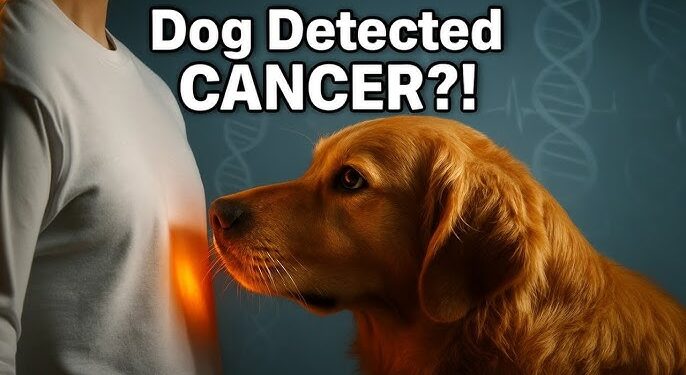A remarkable story featured in BBC Earth’s The Secret Life of Dogs series has captured global attention, highlighting the extraordinary ability of a dog named Max, a red collie cross, to detect breast cancer in his owner, Maureen Burns, before medical tests confirmed the diagnosis. This heartwarming case underscores the potential of dogs’ highly sensitive sense of smell to identify life-threatening illnesses, prompting renewed interest in canine-assisted cancer detection worldwide.
In 2008, Maureen Burns, a resident of Rugby, England, noticed a significant change in Max’s behavior. The typically energetic nine-and-a-half-year-old dog became unusually withdrawn, avoiding physical closeness and frequently nudging Burns’ breast with his nose before retreating with a somber expression. “He seemed sad, almost as if he was preparing me for something,” Burns recounted in the BBC Earth segment. Initially attributing Max’s behavior to aging, Burns grew concerned when the pattern persisted. Prompted by Max’s actions, she discovered a lump in her breast and sought medical attention. A biopsy confirmed breast cancer, and the tumor was successfully removed through surgery.
“The day I returned from the hospital, Max was back to his hyperactive self,” Burns said. “He checked where the operation had been, wagged his tail, and his eyes were bright again. It was unbelievable.” Burns credits Max’s keen instincts for her early diagnosis, which significantly improved her treatment outcome. Now in remission, she remains deeply grateful: “I owe Max so much. He’s my hero.”
Experts featured in the BBC Earth series explain that dogs like Max can detect volatile organic compounds emitted by cancerous tumors, which produce distinct odor signatures in breath, urine, or bodily fluids. A dog’s sense of smell, with 125 to 300 million scent receptors compared to a human’s five million, is estimated to be 10,000 to 100,000 times more sensitive. Research notes that while some dogs naturally exhibit this ability, training can enhance their accuracy in identifying cancer. For instance, a 2021 study in Japan demonstrated a Labrador retriever detecting breast cancer in urine samples with 100 percent accuracy, while a 2019 study showed dogs identifying cancer in blood samples with 97 percent accuracy.
The story of Max and Burns has resonated widely, amassing over 1,100 comments on social media platforms like Facebook, where viewers shared similar experiences. One user described their dog persistently sniffing a mole on their knee, later confirmed as cancerous, while another credited their Great Dane for detecting breast cancer, leading to seven years of remission. These anecdotes align with growing scientific interest in canine cancer detection, as organizations like Medical Detection Dogs in the UK train dogs to identify cancers such as breast, prostate, and colorectal with up to 93 percent accuracy in controlled studies.
Dr. Claire Guest, CEO of Medical Detection Dogs, whose own breast cancer was detected by her dog Daisy in 2009, emphasized the potential for canine scent detection to revolutionize early diagnosis. “Dogs are incredible bio-sensors, capable of detecting odors at concentrations as low as one part per trillion,” she said. Her organization is exploring how dogs’ abilities could inform the development of electronic noses for non-invasive cancer screening.
Despite the promise, challenges remain. Studies indicate varying success rates, with some trials showing sensitivity as low as 71 percent for lung cancer detection, and skeptics argue that dogs’ accuracy can be inconsistent compared to advanced diagnostic tools. Ongoing research, such as a 2024 study combining trained dogs with artificial intelligence to achieve 94 percent accuracy in detecting breast, lung, colorectal, and prostate cancers, aims to address these limitations.
Burns’ story, featured in BBC Earth’s series, has sparked global conversations about the bond between humans and dogs and their potential role in medical diagnostics. As research progresses, Max’s life-saving instinct serves as a powerful reminder of dogs’ extraordinary capabilities, offering hope for earlier cancer detection and improved survival rates worldwide.
Sources: BBC Earth’s The Secret Life of Dogs, Medical News Today, Scientific Reports, Medical Detection Dogs




































